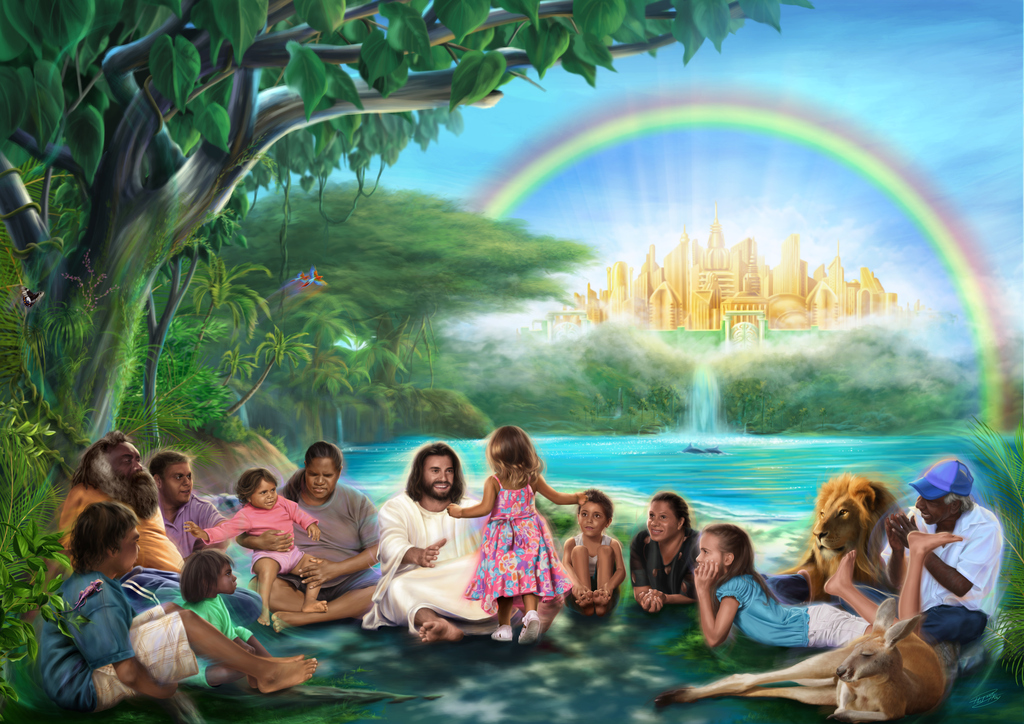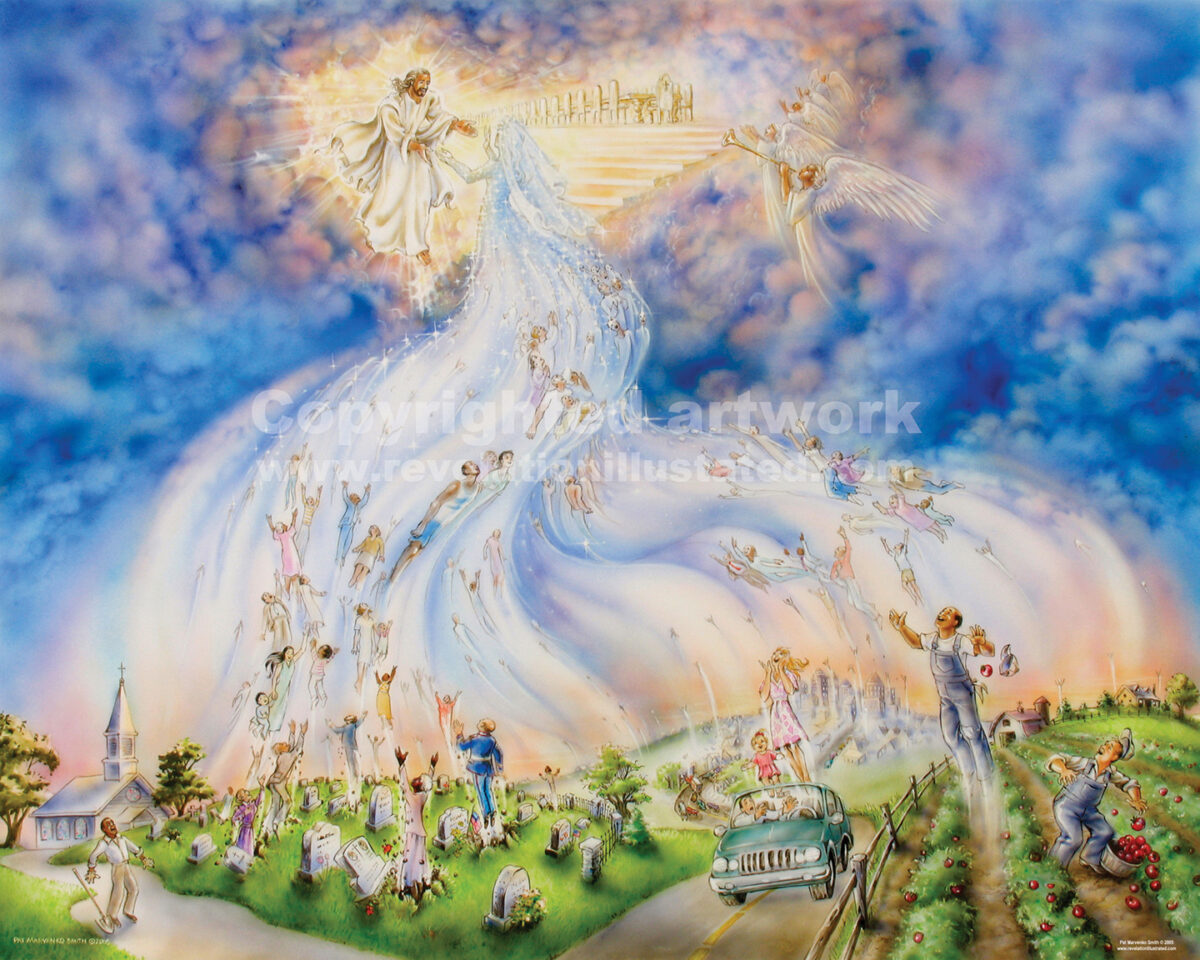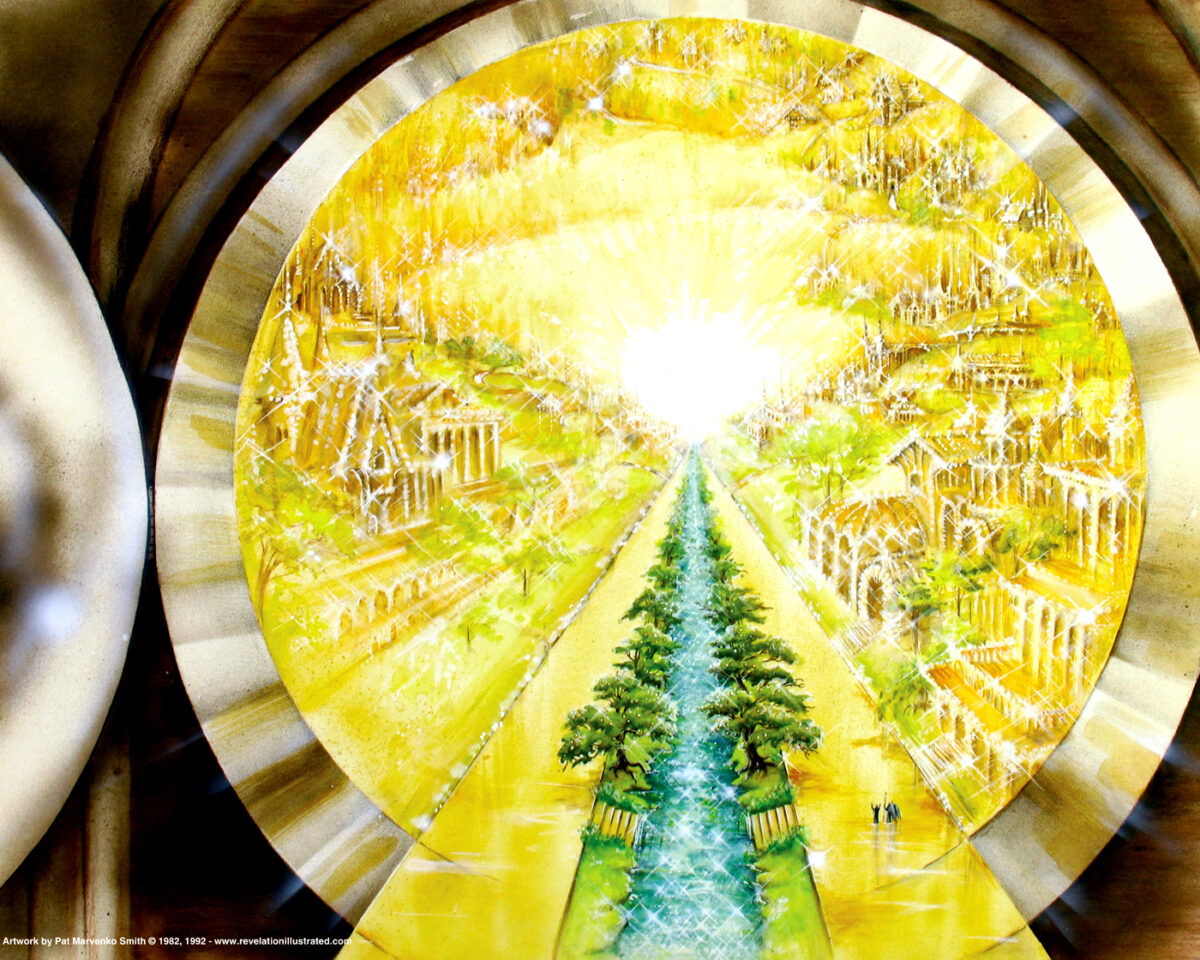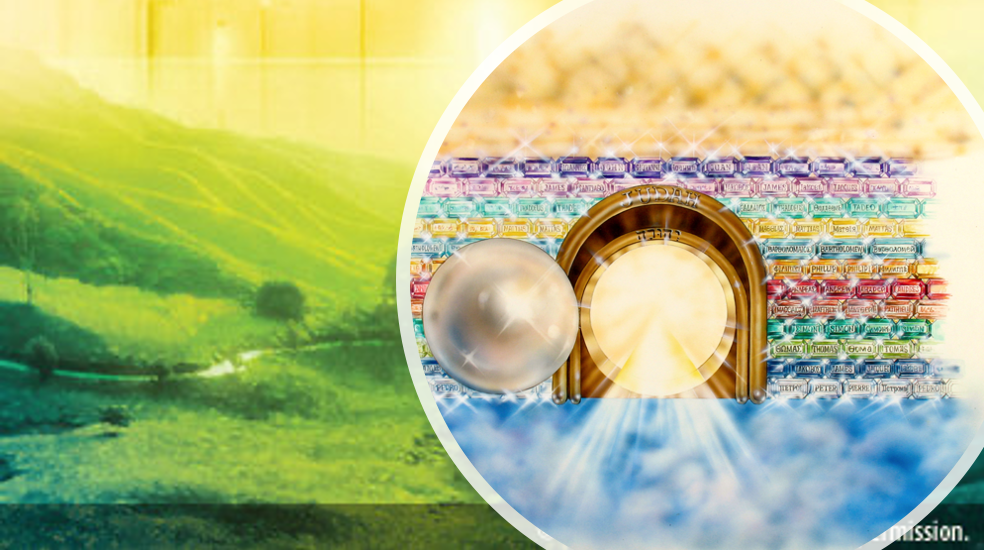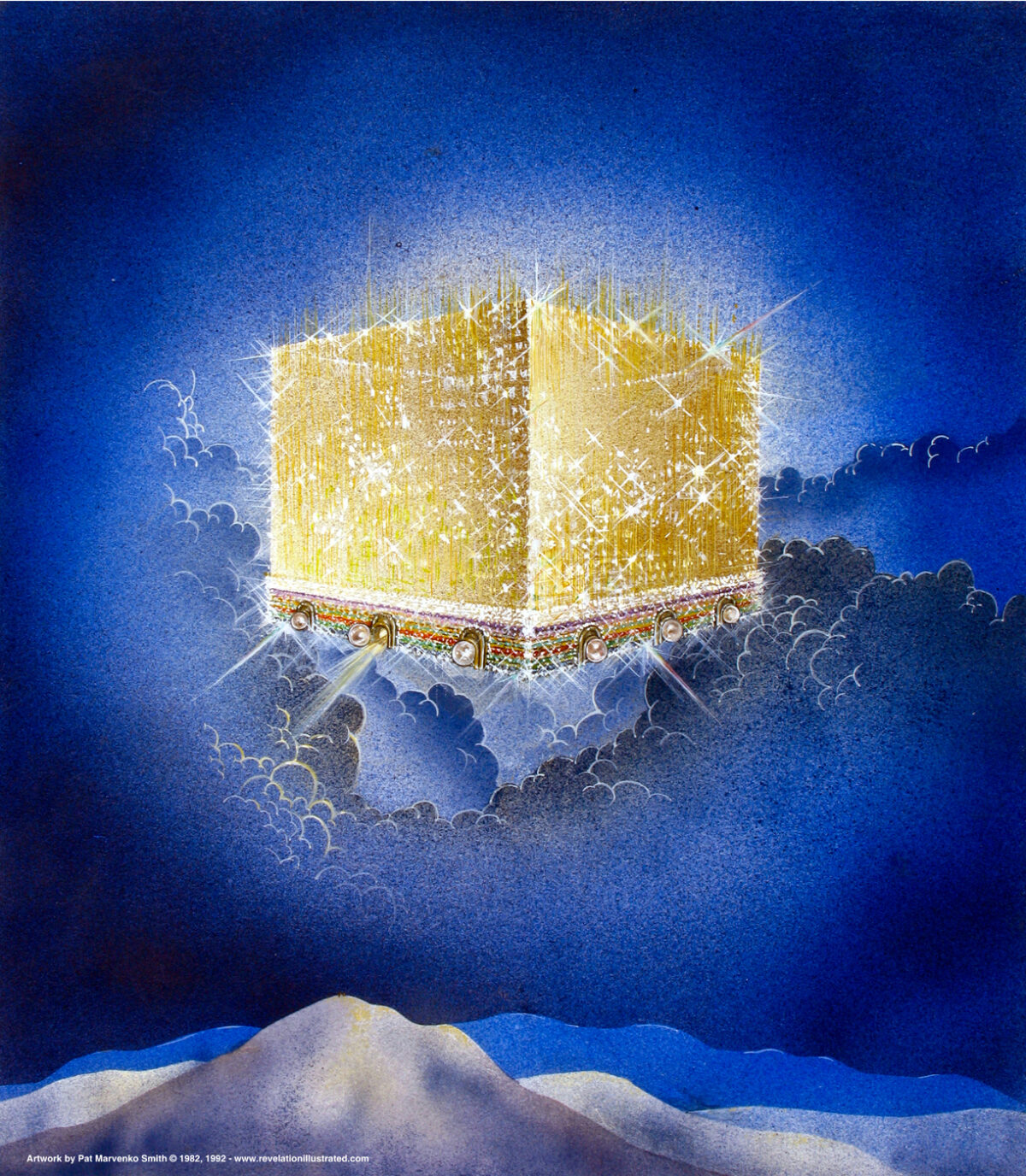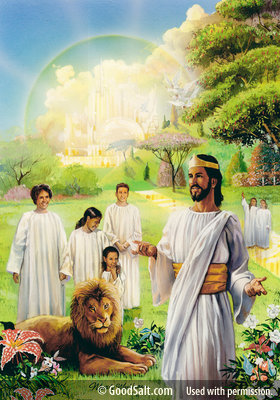“And the Spirit and the bride say, ‘Come!’ And let him who hears say, ‘Come!’ And let him who thirsts come. Whoever desires, let him take the water of life freely.” Revelation 22:17
After the ascended Lord Jesus Christ promised to give obedient believers eternal rewards (22:12-15), Christ then makes plain the divine origin and intended readership of the book of Revelation when He says, “I, Jesus, have sent My angel to testify to you these things in the churches. I am the Root and the Offspring of David, the Bright and Morning Star.” (Revelation 22:16). The combination, “I, Jesus” is used nowhere else in the New Testament and signifies the unique role that Jesus has in producing this book, and in this way bolsters its authority. 1
Christ “sent” His “angel to testify to” the apostle John “these things” in the book of Revelation about His soon return and rewards “in the churches” so His readers will know the message has come from God Himself and is therefore trustworthy. 2 The book of Revelation was written about the future specifically for “churches” not only in the first century (Revelation 2-3), but for all churches to the present day. 3
The message of Revelation is as reliable as its Source. Jesus is the Ancestor (“the Root”) and Descendant (“Offspring”) “of David” and therefore fulfills all the prophecies concerning David’s family. 4 Historically Christ comes from King David (Matthew 1:1; cf. Isaiah 11:11; Revelation 5:5) 5 who established the old Jerusalem as the capital city of Israel, but David’s greatest Descendant will establish the glorious New Jerusalem on the new earth forever! 6
Prophetically Christ’s coming is like “the Bright and Morning Star” heralding the dawn of a new day in history. 7 The phrase “Bright and Morning Star” is “another way of referring to the sun. In the daytime, it is the one star sufficiently luminous and powerful to light the entire earth. Spiritually speaking, Jesus is ‘the bright morning star’ because He is the most powerful source of spiritual illumination and is the sole source of eternal life.” 8
Jesus “is the brightest of all personal stars, just as the morning star is the brightest physical star in the sky. He is the ‘Star’ that, in fulfillment of Balaam’s prophecy, would ‘come forth from Jacob’ (Numbers 24:17).” 9
“The ‘Root’ is buried in the ground where no one can see it, but the ‘Star’ is in the heavens where everyone can see it.” 10
“Like a king affixing a royal seal to an official document, Jesus ties His reputation as Son of David and Son of God to the prophecies of the book.” 11
The last five verses of the last book of the Bible are very telling (22:17-21). It has been said that last words are lasting words.
“They represent the last God-breathed words we have before the return of Christ. In a few lines, the Spirit of God expresses the underlying purpose and message of the entire book of Revelation.” 12
“A person’s last words often provide a glimpse into his or her character, sometimes revealing what that individual values most. Some parting comments are thoughtful; others are spontaneous and sometimes surprising.” 13
The Lord Jesus continues to speak to John. “And the Spirit and the bride say, ‘Come!’ And let him who hears say, ‘Come!’ And let him who thirsts come. Whoever desires, let him take the water of life freely.” (Revelation 22:17). The first thing on God’s heart at the end of the Bible is an invitation for unsaved people to receive eternal life freely. God has revealed future events in the book of Revelation to draw people to Himself.
God’s Holy “Spirit and the bride” of Christ, the church (cf. Revelation 3:14, 20; 19:7-9; 21:2, 9; 22:17; 2 Corinthians 11:2; Ephesians 5:25-32), “say, ‘Come!’” When churches walk in step with God’s Spirit, they will invite people to come to Christ for His free gift because they understand the heart of Jesus Christ. Christ has sent the church to preach the gospel to the whole world and to every individual in that world (Mark 16:5; Acts 1:8). We are not to wait for lost people to come to us. We must go where the lost people are. If we wait for lost people to come to us, we may wait the rest of our Christian lives. Instead, we must go to the unsaved people of this world. Why?
Because Jesus Christ came to earth the first time to seek and to save those who were lost (Luke 19:10). Christ loves all people (John 3:16; Romans 5:8). He desires that all people be saved (I Timothy 2:3-4). He died on the cross to pay the sins of all people (I Timothy 2:5; I John 2:1-2). If we know and love Jesus Christ, we will love the lost people for whom He died and rose from the dead. Instead of avoiding them, we will love them and go to them.
Oh, if only this was on the heart of churches today! So often Christians fight over the meaning of Revelation instead of letting it motivate them to share the gospel with a lost world! Recently, my wife and I attended a church that announced they will be installing a pastor of evangelism this coming Sunday. What a joy to hear this! How many churches have evangelistic pastors on staff today? This is rarely the case because evangelism is not a priority among today’s churches. But this is the first priority of God’s Spirit in the final verses of the Bible.
God has given gifted leaders to prepare His people to serve. God has not only given “pastors and teachers” to equip His people for “the work of the ministry,” but He has also given the church “evangelists” (Ephesians 4:11-12). Evangelists not only make the gospel of Christ known to the unsaved, but they also build up the faith of Christians. 14 “11 And He Himself gave some to be… evangelists… 12 for the equipping of the saints for the work of ministry, for the edifying of the body of Christ.” (Ephesians 4:11-12). The responsibility of evangelists is to train and “equip” Christians to share the gospel with the unsaved. One of the reasons the church has failed to reach the world for Christ with the gospel is because it has failed to make evangelism a top priority. If more churches had evangelists on staff in addition to pastors and teachers, more churches would be equipped for doing the work of an evangelist within their spheres of influence (2 Timothy 4:5).
Jesus then says, “And let him who hears say, ‘Come!’” Those who read or hear the book of Revelation are to invite the lost to “come” to the Lamb of God, Jesus Christ, for salvation. No one else in the universe can wash away our sins. Only Jesus Christ can do this because He is fully God and fully Man (John 1:1, 14) Who died in our place on the cross to pay the full penalty for all our sins (John 1:29; 19:30; I Corinthians 15:3-6; I Timothy 2:3-5; I John 2:1-2; Revelation 1:5; 5:6, 12; 7:10, 14 12:11; 13:8). He then rose from the dead proving His claims to be God are true (Romans 1:3-4).
God never intended for believers to keep the good news of Jesus to themselves. He has saved us so we can take the message of salvation to our unsaved family, friends, co-workers, neighbors, and acquaintances. God wants to use our voices to invite the lost to “come” to Jesus Christ in faith for His gift of eternal life.
During His earthy ministry Jesus explained why nonbelievers did not have eternal life. 15 He said, “You are not willing to come to Me that you may have life” (John 5:40). It was not because they had never heard the truth about Jesus. It wasn’t because they had no Scripture. It wasn’t because they lacked reasonable evidence about Jesus’ identity. It wasn’t because of the pain and suffering they had endured. It wasn’t because of the hypocrisy of believers in Jesus. They lacked eternal life because they were not willing to come to Jesus in faith. God will not force a person to come to Him against his or her will. God lovingly invites all people to receive His gift of eternal life.
Next Christ invites everyone who “thirsts” and “desires… the water of life” to “come” (22:17b). The “water of life” refers to eternal life in John’s writings (John 4:10, 13-14; 7:37-39; Revelation 7:17; 21:6; 22:17). Eternal life is not something we can earn or work for because Jesus offers it “freely” (dōrean) or “without payment” 16 or cost to “him who thirsts” or “desires” (21:17; cf. John 4:10-14; Romans 3:24; 6:23b; Ephesians 2:8-9). Eternal life is free to us because it has already been paid for by Jesus Who “washed us from our sins in His own blood” when He died in our place on the cross and rose from the dead (Revelation 1:5; cf. 7:14; Romans 3:24; I Corinthians 15:3-6; John 19:30). Everyone who believes in Jesus Christ alone for “the water of life” (eternal life) acquires it the moment they believe (cf. John 3:15-16, 36; 4:13-14; 5:24; 6:40, 47; 11:25-26; et al.).
No act of obedience, preceding or following faith in the Lord Jesus Christ, such as commitment to obey, sorrow for sin, turning from one’s sin, water baptism, prayer, persevering in good works, or submission to the Lordship of Christ, may be added to, or considered as a part of, faith as a condition for receiving eternal life (Romans 4:5; Galatians 2:16; Titus 3:5). This saving transaction between God and the sinner is simply the giving and receiving of a free gift (John 3:14-18; 4:10-14; 6:47; Romans 6:23; Ephesians 2:8-9; Revelation 22:17).
If you are not certain you have eternal life, would you like to receive this absolutely free gift from the Lord Jesus Christ right now so you can live with Jesus forever in the New Jerusalem on the new earth with other believers in Him? Simply take Jesus at His Word when He said, “He who believes in Me has everlasting life.” (John 6:47). To “believe in” (pisteuōn eis) Jesus means to be persuaded that He is speaking the truth and is therefore worthy of your trust. 17
If you are convinced Jesus is telling the truth in John 6:47 and is therefore worthy of your trust, then believe or trust Christ alone (not your good life, prayers, or religion) to give you His gift of everlasting life. When you believe in Christ for His free gift of eternal life, you can be just as certain of heaven as the people who are already there. Knowing we are going to heaven is not a guess; it is a guarantee from Jesus Christ (John 14:1-3). 18 If you now believe this, you can tell God in a simple prayer:
Prayer: Dear Lord Jesus, thank You for this last invitation in the Bible to come to You just as I am. Thank You for Your patience in giving me this opportunity to get right with You. I have tried to live life without You only to discover that the penalty of my sin is death or separation from You. Nothing I am or do makes me deserve to go to heaven. I believe You loved me so much You took my punishment when You died on the cross and rose from the dead. I am now believing or trusting in You alone Jesus (not my good life, my prayers, or my religion), to give me everlasting life and a future home in Your heaven. Thank You for the gift of eternal life I just received and for the future home I will have in Your heaven. Please use me now to tell others how they can know for sure they will live with You forever. I ask You God Almighty to renew Your church’s love for You and the lost people for whom You died. In Your mighty name I pray, Lord Jesus. Amen.
ENDNOTES:
1. Tom Constable, Notes on Revelation, 2017 Edition, pg. 265.
2. Bob Vacendak; Robert Wilkin; J. Bond; Gary Derickson; Brad Doskocil; Zane Hodges; Dwight Hunt; Shawn Leach; The Grace New Testament Commentary: Revised Edition (Grace Evangelical Society, Kindle Edition, 2019), pg. 1590.
3. Tony Evans, CSB Bible by Holman, The Tony Evans Study Commentary (B & H Publishing Group, Kindle Edition 2019), pp. 2424-2425; Constable, pg. 256.
4. Constable, pg. 256.
5. John F. Walvoord, The Bible Knowledge Commentary Epistles and Prophecy, Editors John F. Walvoord and Roy B. Zuck (David C. Cook, 2018 Kindle Edition), Kindle Location 6687.
6. Constable, pg. 256.
7. Walvoord, Kindle Location 6687; Constable, pg. 256.
8. Evans, pp. 2424-2425.
9. Constable, pg. 256.
10. Ibid., cites Warren W. Wiersbe, The Bible Exposition Commentary, Vol. 2. (Wheaton: Victor Books, Scripture Press, (1989), pg. 625.
11. Charles Swindoll, Insights on Revelation (Swindoll’s Living Insights New Testament Commentary Book 15, Tyndale House Publishers, Inc., 2014 Kindle Edition), pg. 401.
12. Ibid., pg. 402.
13. Ibid., pg. 401.
14. EvanTell’s The Evangelism Study Bible (Grand Rapids: Kregel Publications, 2014), pg. 1387), pg. 1299.
15. Vacendak, pg. 1590.
16. Walter Bauer, A Greek-English Lexicon of the New Testament and Other Early Christian Literature: Third Edition (BDAG) revised and edited by Frederick William Danker (Chicago: University of Chicago Press, 2000 Kindle Edition), pg. 266.
17. Ibid., pg. 816.
18. R. Larry Moyer, Show Me How To Illustrate Evangelistic Sermons (Grand Rapids: Kregel Publications, 2012), pg. 265.



